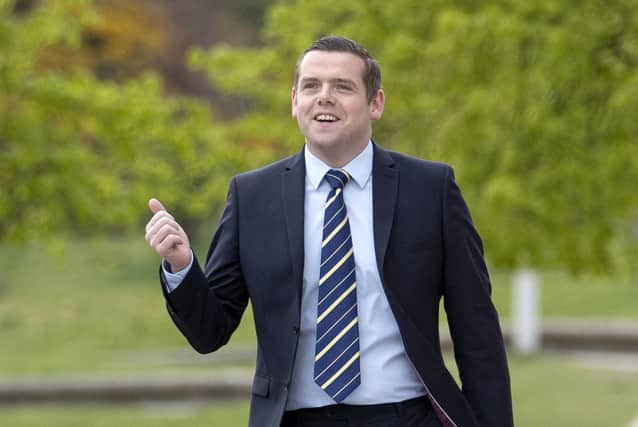How Scottish Tory success stalled drive for IndyRef2 - Murdo Fraser


Without Ruth Davidson as leader, with a challenge from an upbeat Labour Party under Anas Sarwar, and with discouraging opinion poll ratings, the discussion was not around whether we could advance, but rather whether we would retain second place.
In the event, we confounded all the critics. The Scottish Conservative result last week was our best ever in the history of Holyrood, with our highest vote, and vote share, ever. We retained our 31 seats, and were the only pro-UK party to make progress, with both Labour and the Liberal Democrats falling back.
Advertisement
Hide AdAdvertisement
Hide AdDespite being written off by commentators, Douglas Ross’ central message of opposing another independence referendum clearly resonated with the electorate, many of whom voted tactically to support Conservative candidates. Douglas’ team at Holyrood has nine new members and includes, for the first time, Scottish Conservative MSPs from Scotland’s BAME community.
Crucially, it was Scottish Conservative success that prevented the SNP getting the overall majority that they craved. Indeed, after Nicola Sturgeon being widely praised for her performance during the pandemic, the SNP could only deliver a net increase of one seat over their previous performance in 2016.
It is worth reflecting that over the past five years we have had two general elections, the departure of two UK Prime Ministers, a Brexit referendum which delivered a result most people in Scotland did not want, a Tory landslide, and Boris Johnson as Prime Minister – a set of scenarios which could have been calculated by Nationalists as the perfect storm to deliver an SNP majority at Holyrood. And yet, in spite of all this, Nicola Sturgeon failed to achieve what Alex Salmond did back in 2011.
There has been a huge media focus over the past few days on what this means for another independence referendum. It is true that there is a majority in the Scottish Parliament to support another referendum, as indeed there was in the past Parliament. But the argument that there is now an inarguable mandate for that referendum to proceed falls down on a number of levels.
Firstly, it is questionable whether a mandate can be achieved in an election for a policy which cannot actually be delivered by the Party offering it. The law is clear that constitutional matters are reserved to Westminster. So an SNP commitment to hold a referendum on independence has no more legal standing than, say, a manifesto promise to cut corporation tax, or to remove military bases from Scotland. Should a Bill be passed by the Scottish Parliament to hold such a referendum it would be ultra vires, and inevitably be struck down by a Scottish Court.
But this is not just about the law, it is also about politics. Nicola Sturgeon told last week’s final BBC Leaders’ Debate that people should vote for her Party even if they did not support another independence referendum, but now claims every vote as an endorsement of that policy. Even more significantly, when the constituency votes across Scotland are aggregated, it is clear that more people voted for Parties opposing an independence referendum than voted for those which supported one. If we are to hold true to democracy, then surely the view of the majority must prevail.
I look forward to working with colleagues in the UK Government to make the strong and positive case for Scotland’s place in the United Kingdom. We already know that thanks to the UK’s broad shoulders some £23 billion has been provided to Scotland to assist with the Covid pandemic over the past year, in addition to the substantial fiscal transfers that are already paid to support higher levels of public spending in Scotland. I want to see the UK Government taking a more active role in relation to Scotland, demonstrating how our partnership of nations works for the benefit of all. The days of “devolve and forget” must be left far behind.
I simply do not believe that there is much appetite within Scotland to spend another five years arguing over the constitution, and opinion polls would suggest that even supporters of independence do not want to see a referendum anytime soon. In the meantime, there are far more important issues to be getting on with. We need to rebuild our economy post-Covid, and ensure that our public services catch up with all that has been lost over the past twelve months.
Advertisement
Hide AdAdvertisement
Hide AdIt is across fields such as the NHS, education, the economy and the environment that the Scottish Conservatives have ideas about how to take the country forward. On a “blind test” of the different Parties’ manifestos for this election, it was the Scottish Conservative plans for the future that came out on top with the public. We now have the opportunity over the next five years, in a Parliament where no party has a majority, to advance these ideas, and we will work with others to deliver improvements for the good of the Scottish people.
All that will be made much more difficult against a backdrop of continual trench warfare between the Scottish and UK Governments. A responsible SNP Government would accept that they failed to win a majority in this election, and that there is not popular support for pursuing another independence referendum at this time. Sadly, such is the obsession that the Nationalists have with achieving their objective, I fear we are heading for another five wasted years where Scotland fails to advance.
I will be back at Holyrood this week as part of an energetic, refreshed Scottish Conservative team, with new faces and old, ready for the next five years. The Scottish Conservatives have a great platform to build on for the future, and we will start doing just that.
Comments
Want to join the conversation? Please or to comment on this article.